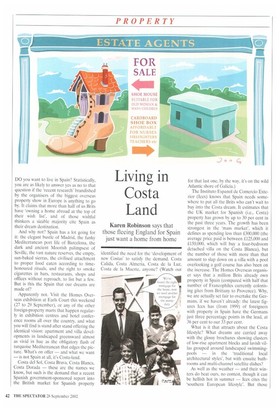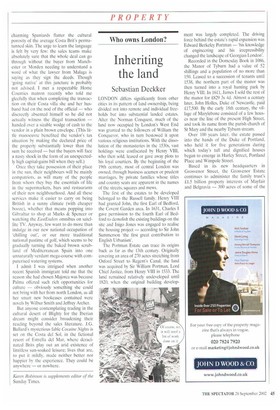Living in Costa Land
Karen Robinson says that those fleeing England for Spain just want a home from home
DO you want to live in Spain? Statistically, you are as likely to answer yes as no to that question if the 'recent research' brandished by the organisers of the biggest overseas property show in Europe is anything to go by. It claims that more than half of us Brits have 'owning a home abroad at the top of their wish list', and of those wishful thinkers a sizable majority cite Spain as their dream destination.
And why not? Spain has a lot going for it: the elegant bustle of Madrid, the funky Mediterranean port life of Barcelona, the dark and ancient Moorish palimpsest of Seville, the vast nature reserves, the empty, sun-baked sierras, the civilised attachment to proper food eaten according to timehonoured rituals, and the right to smoke cigarettes in bars, restaurants, shops and offices without reproach, to list but a few. But is this the Spain that our dreams are made of?
Apparently not. Visit the Homes Overseas exhibition at Earls Court this weekend (27 to 29 September), or any of the other foreign-property marts that happen regularly in exhibition centres and hotel conference rooms all over the country, and what you will find is stand after stand offering the identical vision: apartment and villa developments in landscaped greensward almost as vivid in hue as the obligatory flash of turquoise Mediterranean that edges the picture. What's on offer — and what we want — is not Spain at all, it's Costa-land.
Costa del Sol, Costa Brava, Costa Blanca, Costa Dorada — these are the names we know, but such is the demand that a recent Spanish government-sponsored report into the British market for Spanish property identified the need for the 'development of new Costas' to satisfy the demand. Costa Calida, Costa Almeria, Costa de la Luz, Costa de la Muerte, anyone? (Watch out for that last one, by the way, it's on the wild Atlantic shore of Galicia.)
The Instituto Espanol de Comercio Exterior (Icex) knows that Spain needs somewhere to put all the Brits who can't wait to buy into the Costa dream. It estimates that the UK market for Spanish (i.e., Costa) property has grown by up to 30 per cent in the past three years. The growth has been strongest in the 'mass market', which it defines as spending less than £300,000 (the average price paid is between £125,000 and £150.000, which will buy a four-bedroom detached villa on the Costa Blanca), but the number of those with more than that amount to slap down on a villa with a pool overlooking a golf course has also been on the increase. The Homes Overseas organiser says that a million Brits already own property in Spain (compared with half that number of Francophiles currently colonising gites from Brittany to Provence). Why, we are actually set fair to overtake the Germans, if we haven't already: the latest figures Icex has (from 1999) of foreigners with property in Spain have the Germans just three percentage points in the lead, at 36 per cent to our 33 per cent.
What is it that attracts about the Costa lifestyle? What dreams are carried away with the glossy brochures showing clusters of low-rise apartment blocks and lavish villas grouped around landscaped swimmingpools — in the 'traditional local architectural styles', but with ensuite bathrooms and multi-channel satellite dishes?
As well as the weather — and their winters do beat ours, no contest, though it can be hellish hot in summer — Icex cites the 'southern European lifestyle'. But those charming Spaniards flatter the cultural porosity of the average Costa Brit's permatanned skin. The urge to learn the language is felt by very few: the sales teams make absolutely sure that the whole deal can go through without the buyer from Manchester or Morden needing to understand a word of what the lawyer from Malaga is saying as they: sign the deeds. Though 'going native' at this juncture is probably not advised. I met a respectable Home Counties matron recently who told me gleefully that when completing the transaction on their Costa villa she and her husband had on the nod of the official — who discreetly absented himself so he did not actually witness the illegal transaction — handed over a sizable wodge of cash to the vendor in a plain brown envelope, (This little manoeuvre benefited the vendor's tax situation by making the declared price of the property substantially lower than the sum he received — but the buyers will face a nasty shock in the form of an unexpectedly high capital-gains bill when they sell.) Once they take possession of their place in the sun, their neighbours will be mainly compatriots, as will many of the people from whom they buy the essentials of life in the supermarkets, bars and restaurants of their new neighbourhood. And all these services make it easier to carry on being British in a sunny climate (with cheaper booze), whether that means popping into Gibraltar to shop at Marks & Spencer or watching the EastEnders omnibus on satellite TV. Anyway, few want to do more than indulge in our new national occupation of 'chilling out', or our more traditional national pastime of golf, which seems to be gradually turning the baked brown scrubland of Mediterranean Spain into one unnaturally verdant mega-course with computerised watering systems.
I admit I was intrigued when another recent Spanish immigrant told me that the reason she had chosen Majorca was because Palma offered such rich opportunities for culture — obviously something she could not bring with her from north London, as all her smart new bookcases contained were novels by Wilbur Smith and Jeffrey Archer.
But anyone contemplating trading in the cultural desert of Blighty for the Iberian dream might consider broadening their reading beyond the sales literature. J.G. Ballard's mysterious fable Cocaine Nights is set on the Costa del Sol, in the fictional resort of Estrella del Mar, where deracinated Brits play out an arid existence of limitless sun-soaked leisure; lives that are, to put it mildly, made neither better nor happier by the experience. They could be anywhere — or nowhere.
Karen Robinson is supplements editor of the Sunday Times.



































































































 Previous page
Previous page